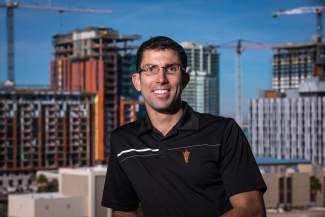David Hondula
Tempe Campus
David Hondula's research examines the societal impacts of weather and climate with an emphasis on extreme weather and health. Recent projects include statistical analysis of health and environmental data sets to improve understanding of the impact of high temperatures on human morbidity and mortality, especially within urban areas. Hondula is also engaged in quantitative and qualitative field work to learn how individuals experience and cope with extreme heat. Developing research considers how to facilitate effective governance and communication strategies for climate adaptation. These efforts are motivated by the overarching goal of reducing unnecessary weather-related illnesses and deaths through effective mitigation and intervention strategies.
Prior to joining SGSUP, Hondula was a postdoctoral scholar and assistant research professor with ASU’s Center for Policy Informatics. Hondula received his doctorate. in environmental sciences at the University of Virginia and during his graduate school tenure was also a visiting scholar at Umeå University in Umeå, Sweden and Queensland University of Technology in Brisbane, Australia. Hondula is an editorial board member for Environmental Health Perspectives and a member of the Association of American Geographers, American Meteorological Society (AMS), International Association for Urban Climate (IAUC), International Society of Biometeorology (ISB), and International Society for Environmental Epidemiology (ISEE).
Ph.D. Environmental Sciences, University of Virginia 2013
M.S. Environmental Sciences, University of Virginia 2009
B.A. Environmental Sciences, University of Virginia 2006
Hondula DM, Balling Jr. RC, Andrade R, Krayenhoff ES, Middel A, Urban A, Georgescu M, Sailor DJ. Biometeorology for Cities. International Journal of Biometeorology 61(1), 59-69.
Allen MJ, Vanos JK, Hondula DM, Vecellio DJ, Knight DB, Mehdipoor H, Lucas R, Fuhrmann C, Lokys H, Lees A, Tavares Nascimentio S, Leung ACW, Perkins DR. Supporting Sustainability Initiatives Through Biometeorology Education and Training. International Journal of Biometeorology, 61(1), 93-106. DOI:10.1007/s00484-017-1408-z
Kuras ER, Bernhard MC, Calkins MM, Ebi KL, Hess JJ, Kintziger KW, Jagger MA, Middel A, Scott AA, Spector JT, Uejio CK, Vanos JK, Zaitchik BF, Gohlke JM, Hondula DM, 2017. Opportunities and Challenges for Personal Heat Exposure Research. Environmental Health Perspectives, 85001, 1.
Hondula DM, Kuras ER, Longo J, Johnston EW, 2017. Toward Precision Governance: Infusing Data into Public Management of Environmental Hazards. Public Management Review, online first publication, DOI:10.1080/14719037.2017.1320043.
Berisha V, Hondula DM¸ Roach M, White JR, McKinney B, Bentz D, Mohamed A, Uebelherr J, Goodin K, 2017. Assessing Adaptation Strategies for Extreme Heat: A Public Health Evaluation of Cooling Centers in Maricopa County, Arizona. Weather, Climate, and Society 9(1), 71-80.
Longo J, Kuras ER, Smith H, Hondula DM, Johnston EJ, 2017. Technology Use, Exposure to Natural Hazards, and Being Digitally Invisible: Implications for Policy Analytics. Policy & Internet 9(1), 76–108.
Other Selected Publications
Gosling SN, Hondula DM, Bunker A, Ibarreta D, Lui J, Zhang X, Sauerborn R, 2016. Adaptation to climate change: a comparative analysis of modeling methods for heat-related mortality. Environmental Health Perspectives. DOI: 10.1289/ehp634
Hondula DM, Balling Jr. RC, Vanos JK, Georgescu M, 2015. Rising Temperatures, Human Health, and the Role of Adaptation. Current Climate Change Reports. DOI: 10.1007/s40641-015-0016-4.
Hondula DM, Davis RE, Saha MV, Wegner CR, Veazey ML, 2015. Geographic Dimensions of Heat-Related Mortality in Seven U.S. Cities. Environmental Research 138: 439–452.
DOI: 10.1016/j.envres.2015.02.033
Petitti DB, Hondula DM, Yang S, Harlan SL, Chowell G, 2015. Multiple Trigger Points for Quantifying Heat-Health Impacts: New Evidence from a Hot Climate. Environmental Health Perspectives 124(2), 176-183. DOI:10.1289/ehp.1409119
Hondula DM, Georgescu M, Balling Jr. RC, 2014. Challenges associated with projecting urbanization-induced heat-related mortality. Science of the Total Environment 490C 538–544.
DOI: 10.1016/j.scitotenv.2014.04.130.
Research Activity:
National Science Foundation award #1737617, Building capacity for smart and connected management of thermal extremes (ASU, University of Buffalo)
National Science Foundation award #1635490, A simulation platform to enhnce infrastructure and communitiy resilience to extreme heat events (ASU, UCLA)
National Science Foundation award #1520803, Enhancing emergency preparedness for critical infrastructure failure during extreme heat events (ASU, Georgia Tech, University of Michigan)
National Science Foundation award #1637590, Central Arizona-Phoenix Long Term Ecological Research Program
National Science Foundation award #1444758, Urban Water Innovation Network, Sustainability Research Networks initiative
Arizona Department of Health Services, Climate and Health Adaptation and Monitoring Program
Geography
Earth Systems
Sustainability
Climate Science
